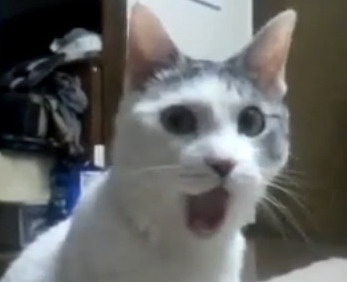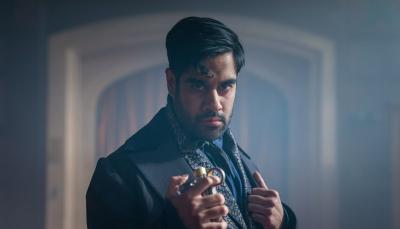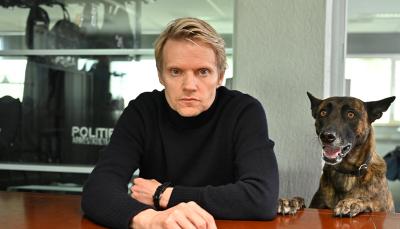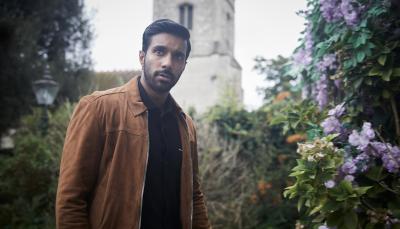The 'Fall' Has Happened – Let’s Dish the 'Sherlock' Series 2 Finale
The Sherlock Series 2 finale screened last night here in America and it’s probably not an exaggeration to say that the photo below is an accurate representation of the reactions of almost everyone who watched it. (Plus probably some crying. I don’t know how to find a cat video where it’s simultaneously shocked and sobbing, but someone let me know if that exists.)

Just to put this out there: “The Reichenbach Fall” is the single best episode of television I’ve seen this year. Hands down, bar none, it’s that good. Funny, clever, tense, exciting, surprising and sob-your-guts-out emotional, I don’t think that there’s been an episode of TV in recent memory – for any show – that’s put me through the wringer like this one. I laughed, I cheered, I yelled at my TV screen, I sobbed. It was amazing.
So, let’s dish about it! Click through for a few of my thoughts on the Series 2 finale, loads of general emotional flailing, and a bit of speculation about where we go from here. Do come chat with me in the comments – would love to know what people thought about this episode, as well as your theories about what happens next.
This episode is so perfect. Really. Therefore, there’s less in the way of well written coherence here and kind of a lot of flailing around in awe. You all deserve a warning for that upfront. But, it's hard to nitpick an episode that's this good, it really is.
Martin Freeman Deserves All the Awards. From the very opening scene of this episode, Martin Freeman apparently feels free to take all of our hearts and stomp all over them. I have tremendous respect for Freeman as an actor – but never more so than in this episode, when he’s playing opposite an increasingly dramatic, erratic and fractured Cumberbatch – because he manages to do so much with the designated “normal” everyday character, ultimately making playing the “straight man” in the Holmes-Watson partnership both interesting and emotionally affecting. Everyone loves watching Sherlock do his thing, even when he’s at his most unlikeable, but I think we all just flat out love John, and it’s his quiet loyalty that comprises the heart of the show.
Personally, I’ve never been so glad in my life that people can’t see into my house while I watch television, because my ugly crying jag was out of control (again). Freeman’s graveside speech where he asks for “one more miracle, Sherlock, for me” was just an instant emotional breakdown. I know everybody believes in Sherlock (and I do too), but, oh, how I believe in John Watson. If Martin Freeman doesn’t win another BAFTA for this next weekend, I’m sending someone a strongly worded email of complaint. He makes a character that could be – that has been – nothing more than sidekick window dressing into someone that’s not only an equal partner for Sherlock onscreen, but someone that viewers care about just as much as (if not sometimes occasionally more than) they do the series' lead.
So Does Benedict Cumberbatch, Actually. See above re: Martin Freeman needing to win a BAFTA next weekend, well that goes double for Benedict Cumberbatch. He does everything in this episode – manages to give us Sherlock at his most unlikeable, his most heartbreaking, and his most heroic, all in the space of ninety minutes. He’s still rude and arrogant and generally awful – as evidenced by his behavior in front of the jury at Moriarty’s trial and his treatment of poor Miss McKenzie who apparently doesn't talk fast enough– but he’s human enough to be afraid of dying and selfless enough to sacrifice what’s most important to him (his genius, possibly his life) to save John and his friends. I hope I can be forgiven if this episode makes me want to hug Sherlock to utter pieces (even if he would hate it). What Cumberbatch always does so well is make the many facets of Sherlock – genius, jerk, narcissist, hero, worst roommate in the world – work as a believable whole, and it's never more in evidence than this episode.
Further, the thing that’s most heartrending about this, for me, are the lengths that Sherlock is willing to go to protect John and the other people he cares about – it’s just such proof that he’s not a sociopath, or a psychopath, or anything other than the hero that he pretends so hard not to be. Of course he is still a genius and a narcissist and a terrible person a lot of the time, but that’s not all the character is about. And the moment where he realizes that John’s never going to believe that he’s a fraud, well, pass the tissues again, please. I think it’s such a limited view to think that Sherlock, as a character, has to be or only can be one way, it’s so much more interesting when he’s got layers and internal conflict and all that sort of thing going on. And Cumberbatch is exceptional at doing that in his performance – making Sherlock someone you want to cheer for, even when you may not like him very much or understand him that well.
Sherlock and John’s Friendship Just Amazes Me. It would be possible to write an entire post that’s basically just a love letter to Sherlock and John’s incredible friendship, based on the last twenty minutes of this episode and that absolutely heartstopping goodbye conversation between them when Sherlock’s on the roof and John’s on the street in particular. But, it’s been several months since the first time I saw this episode and I still can’t seem to advance much past BUT THEY LOVE EACH OTHER SO MUUUCCCCH and LOOK HOW SHERLOCK’S ACTUALLY CRYING and “I WAS SO ALONE AND I OWE YOU SO MUCH,” accompanied by the sounds of my sobbing and flailing around, so I doubt I’m going to be able to do very well with it today. Still. Know that impetus is there.
But, honestly, I will say this: I can’t remember the last bit of television that affected me this strongly – and it’s certainly not because the story Is anything new. If you’re seen almost any Holmes adaptation before, you know what “Reichenbach” means, and you know what’s going to happen, basically, and you know it’s not going to be real, that Sherlock will come back, etc. etc. But, this time around, even knowing all that, it’s the performances – it’s this particular incarnation of the Holmes-Watson friendship – that make this episode feel like it’s the first time anyone has ever told this story before. It was so emotional and real and surprising, It’s impossible to watch this and not conclude that these are basically the two best best friends ever, not to see how much the two of them are basically the most important things in the world to each other, not to be moved by Sherlock’s emotional reaction to John and the lie he’s got to tell him, and not to be impressed by the scale of what Sherlock did, of what Sherlock was willing to risk, to save the people he cared about most. He’s basically the worst sociopath ever. (He’s not a sociopath at all in the first place, if you ask me, but that’s another rant.)
My heart was in my throat for the entire back-half: I gasped, I cried, I cheered at the very end. I am worried for Sherlock, I am heartbroken for John, I am distressed that Series 3 won’t even start filming until January of next year. I need to eat some chocolate.
The Interesting Case of Sherlock as Fairy Tale. One of the most interesting bits about the plot of this episode is the fairy tale motif that runs throughout. It’s a trick that Moffat productions seem to enjoy using (see also: the past two series of Doctor Who), but it’s actually more interesting when used here, put in a world that’s very un-fantastical and a character who is so anti-, well basically everything that fairy tales are about. (I assume the Doctor loves fairy tales. Sherlock not so much. Though how he deleted the solar system and kept Hansel and Gretel in the mind palace, I don't know.)
The bit of plot exposition in the cab when Moriarty’s Max Headroom video explains the story of Sir Boast-a-lot and how everyone lost faith in him over the accompanying montage of everyone doing just that was exceptionally well done, increasingly tense and lovely to look at. But the main reason I love the fairy tale stuff is that it gives us a larger thematic idea that cancels out the fact that the actual plot of the episode – well VERY slick and clever – is really just a giant MacGuffin to get Sherlock on the roof of St. Bart’s. There’s no keycode that can open any door, the assassins next door aren’t actually that important, there’s no threat to national security, and there never was. But the we’ve already set up this sort of alternate way of looking at this story, that’s bigger than things like national security. (Thankfully!) It’s not a story about solving a problem – it’s a story about ideas. How much do we trust the people we know? How much do we trust ourselves? Can you still be the person you think you are, the person you project yourself as, if no one believes in it (or you) any more? Are you more than the story of you? Does it matter if there’s still one person that believes you, believes in you, even though no one else does?
Now I think about it, this is probably why I love that internet “Believe in Sherlock” campaign so much. Because it plays into all those same themes so nicely. I’d give anything for a hat-tip to that in the show. (Yes, I’ve a “I Believe in Sherlock” sticker on my desk and my laptop. Totally doing my bit.)
So, How’d He Do It? Does anyone have any good theories yet? I’m sure we’ll have talked this issue into the ground by the time Series 3 rolls around, but so many exceptionally clever people watch this show, I think that one of us has to be able to figure out how they are planning to explain Sherlock’s “death.”
My theory: First, obviously Molly was a key player here. Whether that means she pronounced Sherlock dead when she knew that he wasn’t, or whether she played along to make sure he looked dead the whole time is up in the air, but obviously she was one of the first and most important pieces. Looking down at the street from where Sherlock’s standing, it also appears that there’s some sort of rubbish skip or transport bin not too far from where Sherlock “lands” – I don’t imagine that it’s out of the realm of possibility that Sherlock somehow managed to actually land in said skip (with help from the Homeless Network maybe?) before artfully arranging himself on the ground. (I've seen too many cop shows to know how easy it is to get fake blood on television. I predict that Sherlock had a bunch of exploding pellets or something or other, to create that (huge) puddle of blood on the ground.
It’s also clear that John’s positioning in the street was important – this is Sherlock’s version of a magic trick, really, where he holds John’s attention through misdirection so that he completely misses whatever is going on just off to the side or outside of his immediate line of sight. (Sherlok is so adamant, after all, that John not look away from him and there's no real reason for it: John won't see the snipers, after all.) The fact that John got hit by a biker also had to be on purpose, it disoriented him just long enough that he saw Sherlock jump, he saw Sherlock fall, but it's not clear that he actually ever saw him hit the ground. John rushes to Sherlock, and doesn’t realize that he never saw the impact. Another bit that I presume is important is the moment in the lab that feels like a throwaway shot, when Sherlock is bouncing a rubber ball back and forth against the wall. Thanks to some very strange Google searching and very smart input from Tumblr, I now know that it’s possible for a person to use a rubber ball held in their armpit to fake not having a pulse. It seems pretty likely that that is what happened here and that Sherlock's actual positioning on the ground is important (i.e. he wants John to be closest to/touch first one wrist over the other.)
I also wonder if we won’t find out that Mycroft isn’t somehow involved in this cover up at some point down the road. Yes, Mycroft isn’t listed on Moriarty’s hit list of people Sherlock cares about, but that may be simply because he underestimated the Holmes brothers’ relationship in light of Mycroft’s poor choices as far as keeping his brother’s secrets go. I don’t read Mycroft and Sherlock’s relationship as particularly warm, but they are family and I believe that the elder Holmes wouldn’t do everything possible to help Sherlock’s plan succeed if given the opportunity. Also, as much as I adore Molly, and as much as she was probably instrumental in Sherlock’s success at faking his death, she doesn’t have the contacts in the wider world to help Sherlock stay “dead”. It’s Mycroft with the government access, the CCTV access, the information access that Sherlock will need to track down the snipers and other (I assume there are some of these?) various Moriarty-associated toadies that could kill his friends. There’s no way he’d avoid even just the CCTV (London is crawling with it) by himself, let alone everything else.
So, I think Sherlock had a lot of help, and a lot of good timing, and a lot of good physics involved in this, in the end. They folks in charge of Sherlock are, of course, keeping the secret of how he pulled this off under wraps, but I hope it ends up being worth the year of speculation we’re going to spend on it. (I need it to be a bit more complex/fleshed out than the pool cliffhanger resolution, too, while we’re taking requests, universe. Just saying!) But, I certainly can’t deny that I’m dying to know how he did it – and I can’t wait to see how John reacts – though I’m torn whether I need him to hug Sherlock, then punch him in the face, or the other way around.
What did you all think of this episode? Theories on how Sherlock pulled it off? General flailing or other emotions to share? Come chat in the comments!




